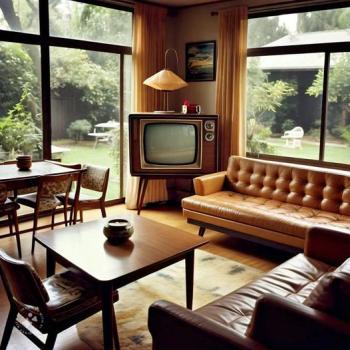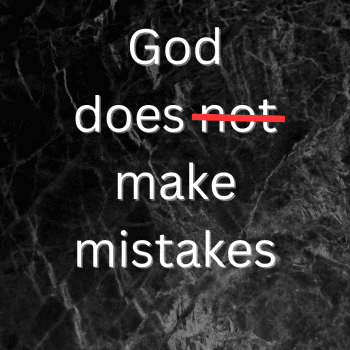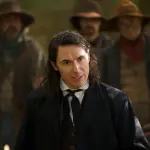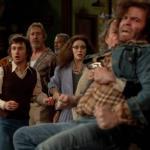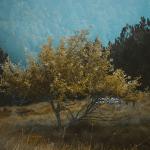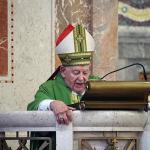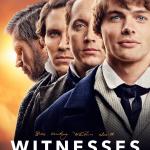My First Pride
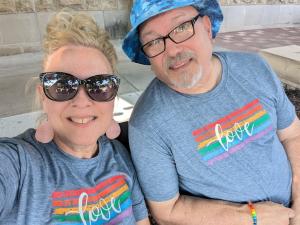
We woke early on Saturday morning and traveled to Omaha to attend the Heartland Pride festival. We were intentional this year about attending Pride, but during June, it just didn’t work out, so we drove about 70 miles to Omaha, Nebraska. My best-laid plans didn’t work out because we got there an hour early in downtown Omaha, packed with people. I admit it: I underestimated how big it was going to be.
After a few minutes of frustration, I backed off my plan to get close to the festival arena and circled to find a parking garage within a few blocks of the parade route. I never realized how uneven sidewalks and pavement are until I became disabled. I can walk about 50 yards before my hip won’t let me go any further. Nevertheless, we reached the parade route and perched ourselves under a tree next to a tall building behind a candy-getter squad.
Someone handed us a multicolored bracelet, which would be the beginning of our obsession later in the day with finding free stuff from all the vendors at the festival. Our biggest grab was the chip clips and koozies, which we may never use.
There were 190 floats/groups in the parade. You could see the effect of encouragement when people yelled and clapped; the faces of the float riders would change instantly. The parade’s point was not to entertain the onlookers; it was for the onlookers to encourage those on the floats who were brave and being themselves. It was the best parade ever for me!
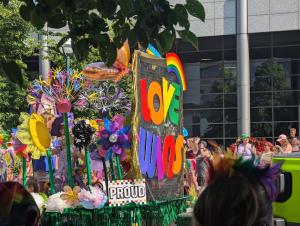
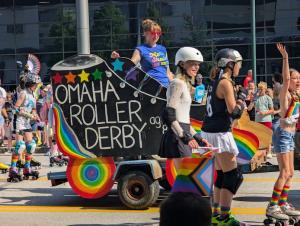
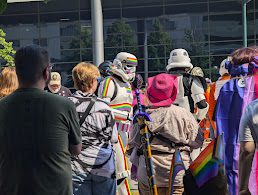
After the parade, we returned to the parking garage, got a drink, ate, and moved our car closer to the arena, which was impossible earlier. Once I finally hobbled into the convention center, more walking would be done. But Laura joined in my enthusiasm for getting free stuff, and we spent about an hour wandering through the vendor area.
In the early afternoon, we made our way to the arena for the evening shows, which consisted of drag queens, a comedian (Tig Notaro), a DJ, and more drag queens. The DJ kept us entertained as people filtered into the large arena. Laura and I did what we sometimes do—we people-watched. We cheered, we listened, and we laughed!
The drive home seemed quick as we relived the day’s memories of what we liked best and didn’t like. Most of what we didn’t like centered around the preacher handing out tracts to convince people of their sinfulness so he could accept them. More on that later. My favorite thing was watching the faces of the people on the floats when people encouraged them from the stands.
As I am prone to do, I couldn’t help but reflect on the lessons I learned from the day. I learned these lessons not by sitting in an ivory tower and imagining what I thought was good or bad about the event but by my actual experience.
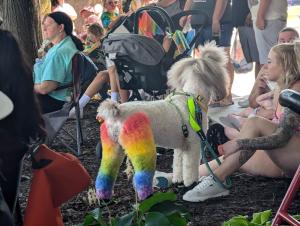
Lessons from my first Pride
- People are happiest when they can be themselves.
At most Christian events I have attended, I noticed that everybody mainly dressed the same. This plays out in actual churches, not just big events. But even at those larger gatherings, the focus is more on conformity than expression. The individual’s dress doesn’t show their personality or feelings; it shows their identification with the larger group.
At a country western show, you might find people sporting boots, cowboy hats, and tight jeans, which conform to the higher group expectations. A pink cowboy hat or a man in a dress might attract attention or rebuke, such as, “You’re in the wrong place.”
The goal of Christianity is to conform. The trouble is that all that is based on interpretations and suppositions about what is good, proper, and appropriate. The speaker, pastor, or priest strongly encourages people to change their ways and become more like the bigger group, while the group urges the speaker to speak about what they want them to say and say it in a way that makes them feel like they’re in control.
People at pride were being themselves; they were expressing themselves. This not only made them feel good, but it encouraged all of us to be ourselves and love each other without conditions. It’s what I always wished the church would be like.
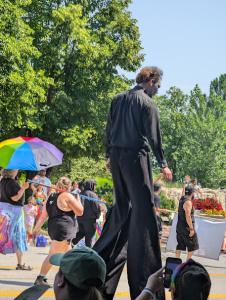
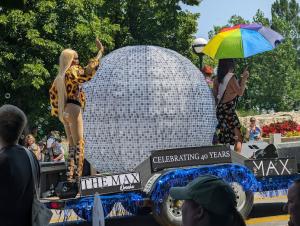
- Churches still did the wrong thing.
Recently, we interviewed Brady Hardin from “The Life After” podcast. When we told him we were going to our first Pride and asked about how we could best be an ally, he lamented about pastors wearing their collars and promoting their stuff instead of just celebrating with the LGBTQ+ community. It didn’t take long to see this in action at the parade and vendor areas. One group even marched in the parade, pronouncing their inclusiveness with the pastor in the middle of them, touting a sign, “This Pastor Loves You.”
Even though that’s a good sentiment, it is directed at the wrong people. As with most things with pastors, it is directed towards attracting more people to his organization. The queer people were in the parade and probably would have better received those words in his actions toward them, not on a sign that directs people to his specific church. By the way, there were more of them in the vendor area in full marketing mode.
But the worst, by far, was the guy handing out tracts that contained the Romans Road, which condemns people for their “sins” and offers them a plan to be redeemed. Again, this fella, dressed in his cool pastor’s garb, was spreading the word that everyone there was condemned because they didn’t follow his specific way of redemption and missed the whole point of the day. When I texted him later that day, my assumption was verified that he was utterly ignorant of the day’s purpose and only interested in promoting his version of hate that feels like love to him. He was trying to save us all!
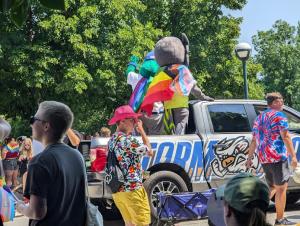
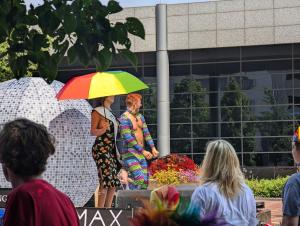
- I wish the world were more like this.
On the way home, we started getting messages about the fact that someone attempted to assassinate former President Trump. Reluctantly, I listened to the news coverage. Still, I didn’t want to spoil what I experienced during my first Pride with the absurdity of the political system developed in the United States. Even though I occasionally comment on church and politics, it’s not where I want to live, and it’s not the world I imagine for my grandkids.
So, to imagine a new world, a key focus is what we consider love. Is love judgmental and harmful, like many churches tend to be? Is love based on our political affiliations or even our religious beliefs? Is love just for certain people who act and look like us? Can love only exist between a man and a woman, or is it possible (and even natural) for many to be in love with the same sex or even not to be sexual at all?
At the parade and festival, a great mix of humans was too numerous to describe, but they all had similar characteristics. Every person that we encountered was respectful and kind to us. Before you dismiss that too quickly, think about the last political situation you encountered or what happened the last time you discussed something controversial with someone online. How often are those things not respectful, and how often are Christians not kind at all?
People were not singled out for their differences; they were celebrated. There were furries, lesbians, drag queens, men in short shorts, and old codgers like me. No one was singled out or embarrassed because they looked different; they were accepted and respected by all (except the tract guy).
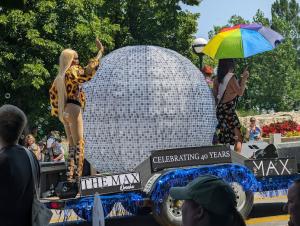
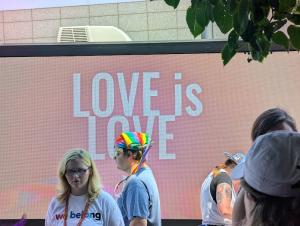
- We were welcome to celebrate without conditions.
To understand this, it helps to think about church and how we require people to pass a membership class, dress in a certain way to be acceptable, or nod and admit to anything we don’t personally do or condone. In politics, think about how we can dismiss a human being because they have a different political stance than we do.
What I think is most important is whether people are harmed by what I do and/or what I say. After interviewing over 325 people on our podcast, I would estimate that far more people have been harmed by high-control religions that try to regulate actions and control behavior. When people are genuinely accepted, loved, and cared for, they will act in ways that do not hurt people instead of the alternative that harms people neglectfully by putting the organization’s needs (church or party) first.
There were a couple of buses in the parade, but no bodies were behind them.
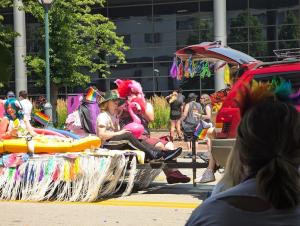
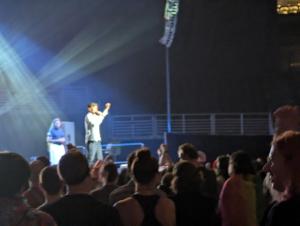
- Since becoming affirming…
For me, my evolution from homophobia has been much like my journey with racism. It has been a long, slow one. When I realized both of these things, it broke my heart because of how I was treating other human beings, and I was determined to face things in the right direction and advance carefully.
At every mile marker, I tend to stop and check myself with people who know much more about these things than I do. In general, they have been patient and helpful in explaining what I might have learned myself if I had paid attention earlier in life. I would have seen the suffering of other humans who weren’t like me and changed course sooner.
As Christians, Republicans, Democrats, Atheists, Agnostics, and white people, we all must face the reality that there is more we don’t understand than what we do. We realize that someone handed us a summarized manifesto of how the world works and how we should appreciate our differences. Most of us were indoctrinated early in life so that our church would be full and the community we live in would mostly think the same.
It’s only after deep introspection that we realize we might be wrong and have spent most of our lives defending the positions and assumptions that someone handed us and/or guilted us into believing that we begin to move forward.
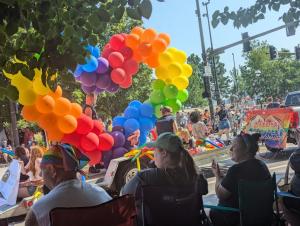
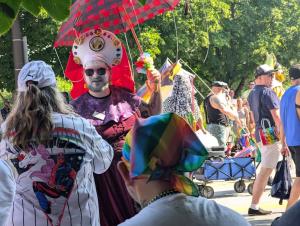
I am a better person because I am on this journey. I say this as a former pastor of 20 years, of which I feel some remorse for being part of the problem. But it wasn’t like the religious prognosticators predicted; I am more moral, just, and loving than ever. Most of my angst these days is directed towards pastors and politicians who want us all to be the same. That is not even true in my immediate household, where everyone was raised in the same situation—we are all different, and Pride taught me to celebrate this rather than excluding or trying to change them.
I encourage you to participate in a Pride event next year if you can get past your indoctrinated fear. While you’re there, observe. You do not need to point out things you don’t agree with or relate to as relevant. Just observe. Don’t bring products to sell or figure out what you should DO. Just BE present and be yourself.
At the end of the day, you might feel the deep satisfaction of authenticity and presence. Dare I say that you might even emerge a better person because you joined the celebration of you and “them?”
Happy Pride,
Karl Forehand
Treasure Trove of Trauma Resources
 Karl Forehand is a former pastor, podcaster, and award-winning author. His books include Out into the Desert, Leaning Forward, Apparent Faith: What Fatherhood Taught Me About the Father’s Heart, The Tea Shop and Being: A Journey Toward Presence and Authenticity. He is the creator of The Desert Sanctuary podcast and community. He is married to his wife Laura of 35 years and has one dog named Winston. His three children are grown and are beginning to multiply! You can read more about the author here.
Karl Forehand is a former pastor, podcaster, and award-winning author. His books include Out into the Desert, Leaning Forward, Apparent Faith: What Fatherhood Taught Me About the Father’s Heart, The Tea Shop and Being: A Journey Toward Presence and Authenticity. He is the creator of The Desert Sanctuary podcast and community. He is married to his wife Laura of 35 years and has one dog named Winston. His three children are grown and are beginning to multiply! You can read more about the author here.





